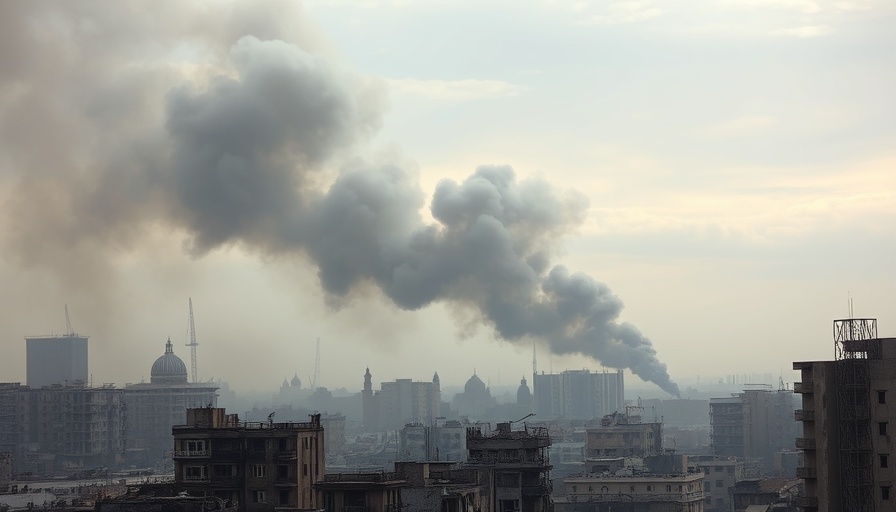
Understanding the Context Behind Operation Gideon Chariots
On May 17, 2025, Israel initiated a significant military operation within the Gaza Strip named Operation Gideon Chariots. This operation aims to exert pressure on Hamas, the militant group governing Gaza, to release hostages taken during previous conflicts. According to Defense Minister Israel Katz, the Israeli Defense Forces (IDF) are pursuing this operation with substantial military force. But what are the deeper implications of such an escalation in one of the world's most volatile regions?
The Humanitarian Crisis: A Ticking Time Bomb
As Israeli airstrikes continue, the toll on the civilian population in Gaza mounts. Recent reports indicate that over 100 Palestinians have lost their lives in the ongoing conflict, exacerbating an already dire humanitarian situation. The United Nations and various humanitarian organizations have expressed deep concerns regarding the worsening conditions. Aid has been severely restricted, with many regions facing shortages of basic supplies, electricity, and medical assistance.
This humanitarian crisis is not just a matter of immediate survival; it severely impacts long-term regional stability. Human suffering often breeds radicalization and resentment, which can perpetuate the cycle of violence. The international community's response is crucial, but it seems sidelined by events as discussions have faltered in Doha.
The Role of International Diplomacy
Interestingly, the current military escalation coincides with U.S. President Donald Trump's recent visit to the Middle East. His trip sparked optimism that diplomatic negotiations might yield a ceasefire or the resumption of humanitarian aid. However, these hopes dimmed as his schedule did not include a visit to Israel, leading many to question the effectiveness of current diplomatic efforts.
Hamas's leadership, meanwhile, continues to communicate a desire for a significant deal that would address the ongoing conflict. However, Israel’s firm stance against negotiating terms that could potentially empower Hamas complicates these discussions further.
The Choices Facing Leaders and Their Consequences
The Israeli government's announcement of Operation Gideon Chariots marks a decisive shift in strategy. Prime Minister Benjamin Netanyahu indicated a determination to eradicate Hamas as a governing authority in Gaza, despite potential backlash from international stakeholders. This approach raises critical questions: What are the long-term consequences of a military solution? Will eliminating Hamas create a power vacuum that could exacerbate violence from other factions?
Israel's leadership appears undeterred, emphasizing national security as a priority. However, public sentiment within both Gaza and Israel might yield unpredictable results, as families on both sides continue to suffer under the specter of conflict. It beckons a broader discussion on whether military operations provide a genuine resolution or merely a temporary reprieve.
Connecting Local and Global Perspectives
The events occurring in Gaza are not isolated from global reactions. Various countries and international organizations have voiced differing opinions regarding Israel's military operations. Some support Israel's right to protect its citizens, while others condemn the human cost associated with military action against a civilian population. Understanding these perspectives illuminates the complexity of international relations and underscores the necessity for a nuanced approach to Middle Eastern policy.
Looking Towards the Future: Can Peace Be Achieved?
The ongoing situation in Gaza is characterized by complexity and historical depth. As military operations continue, the prospect for peace seems increasingly fragile. Analysts suggest that a sustainable resolution will require not just a cessation of hostilities but a significant commitment to diplomatic engagement from all parties involved.
Addressing underlying grievances, fostering economic stability, and promoting cooperation will be essential elements in creating an environment conducive to lasting peace. The upcoming days and weeks will be critical as regional and international powers reassess their role in the unfolding narrative.
As we monitor these developments, it becomes evident that the implications of this operation extend far beyond the immediate military goals; they touch upon humanitarian principles, diplomatic relationships, and the larger aspirations of peace in a historically troubled region.
 Add Row
Add Row  Add
Add 




 Add Row
Add Row  Add
Add 

Write A Comment